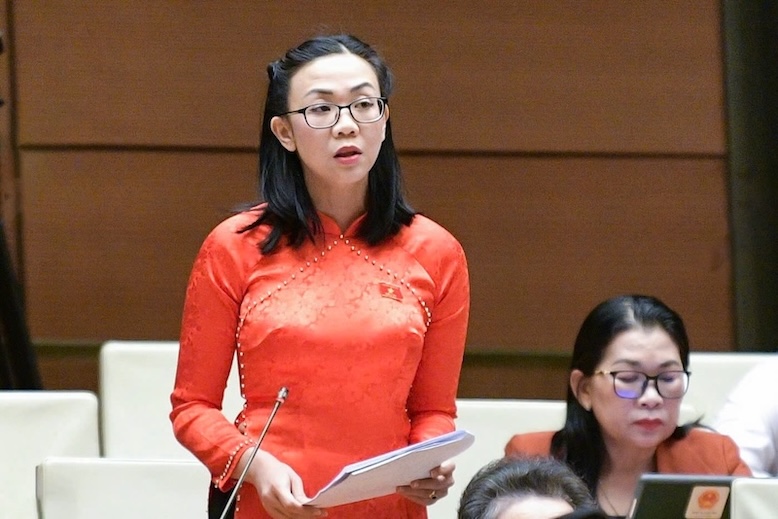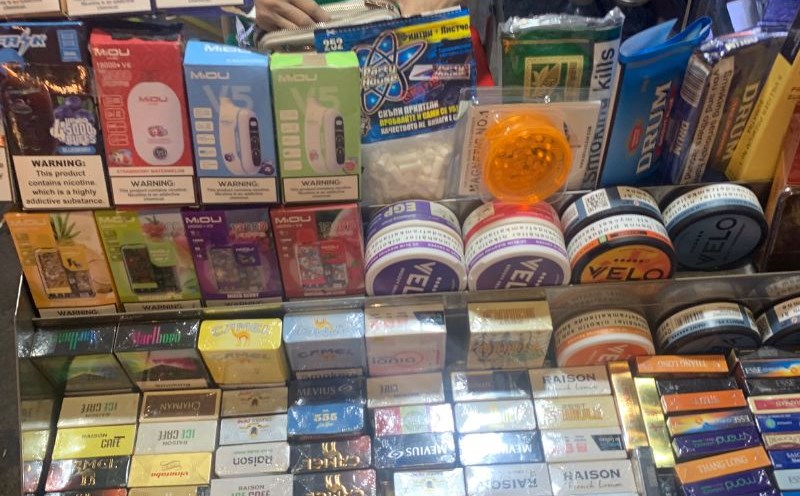Although Resolution 173/2024/QH15 of the National Assembly clearly stipulates the ban on the production, trading, import and use of electronic cigarettes (e-cigarettes) from 2025, in reality, the e-cigarette underground market is still bustling, even open on social networks. This situation has been reported by Lao Dong newspaper through a series of articles on the Underground Market of Electronic cigarettes.
The series of articles after being started to be published received the attention of public opinion and National Assembly deputies. Talking to Lao Dong reporters on the National Assembly corridor, the 10th session of the 15th National Assembly, many National Assembly deputies said that the cause of the situation lies in legal loopholes, weakness in implementation and lack of effective coordination mechanisms between functional agencies.
Legal loopholes and weaknesses in implementing the ban
According to Delegate Trinh Thi Tu Anh (Lam Dong Delegation), the strong operation of the underground e-commerce market shows that the ban is not really effective. The delegate pointed out three systematic reasons, in which legal loopholes are the biggest factor.
"Although the ban has been stipulated in Resolution 173/2024/QH15, the current sanctions are still not strong enough to deter. The current administrative fine - usually only a few tens of millions of VND - is too low compared to the huge profit from illegal business. Therefore, many subjects consider it an acceptable "business cost" - delegate Tu Anh stated.
In addition, the current legal framework has not promptly covered new variants of e-commerce, especially products containing nicotine salt, synthetic fragrances or new chemical compounds. The lack of a legal basis to identify and control these components makes supervision almost impossible, delegate Tu Anh analyzed.
In addition, the rapid development of social networks and e-commerce makes controlling the online business environment more difficult than ever.
"E-cigarette sales and advertising activities are carried out publicly on cross-border platforms, where sellers and buyers can remain anonymous and transact through unofficial payment channels. Meanwhile, the inspection force is still thin and lacks a team of full-time staff with deep expertise in reconnaissance and handling of violations in cyberspace, especially transactions via international social networks" - the female delegate emphasized.

Sharing this view, delegate Pham Van Hoa (Dong Thap delegation) also said that the current widespread situation of e-commerce clearly reflects loopholes in state management. He affirmed that the Law on Prevention and Control of Tobacco Harm has banned the import of tobacco, including e-cigarettes, but "this product is still publicly sold in many places".
According to the delegate, most of the import-export goods on the market are smuggled goods, passing through unofficial routes or entering border gates that authorities cannot detect. "Although the authorities have taken many measures, there are still gaps in management. Relevant agencies need to sit down and review their roles and responsibilities to clarify why smuggling is still happening," he said.
Delegate Pham Van Hoa also pointed out the situation of e-commerce being widely advertised on social networks and e-commerce platforms, affirming that this is also a smuggled goods. Agencies can completely handle it if they take the initiative, because detecting and handling these transactions is not difficult. The problem is whether we do it or not, he stressed.
Strong coordination mechanism is needed between ministries and branches
According to delegate Tu Anh, the ban on e-commerce is related to many agencies - from Health, Industry and Trade, Customs, Police to Culture - but the current coordination mechanism is not strong enough.
"Authors can arrest at the border, but when goods enter the country, the police and market management forces must handle them. However, sharing information, tracing the origin or scanning large lines is still very disjointed, she stated the reality.
In addition, the responsibility of digital platforms such as Facebook, TikTok, Shopee or Zalo in controlling advertising content and e-commerce sales has not been strictly regulated. The delegate proposed that there should be a legal framework forcing these platforms to proactively use technology and artificial intelligence (AI) to detect and immediately remove violating content.
It is necessary to apply strict sanctions such as calculating fines based on a percentage of revenue or global revenue for uncking platforms. This is an effective deterrent, forcing them to be responsible for censorship, proposed the Lam Dong delegate.

According to delegate Pham Van Hoa, e-commerce management is an interdisciplinary responsibility: Customs control at border gates, Market management for domestic handling, Ministry of Health participates in quality assessment. However, to make this work effective, it is necessary to increase the responsibility of the head.
"If there is a situation of smuggling e-commerce trading and circulation without detection, it is necessary to consider the personal and collective responsibility of the head of the local management unit," he said.
Delegate Trinh Thi Tu Anh said that the core reason for the continuous development of the e-commerce underground market is because "the current penalty level is still too light compared to huge profits".
The profit from e-commerce trading, especially smuggled goods, is many times higher than the current administrative fine - usually only a few tens of millions of VND. "The social consequences caused by e-commerce are extremely serious, especially for young people's health. Therefore, it is necessary to consider legalizing large-scale illegal e-commerce business, taking advantage of social networks to organize networks, she suggested.
In addition, Ms. Tu Anh proposed raising the administrative fine to hundreds of millions, even billions of VND, or a fine according to the estimated percentage of illegal revenue. At the same time, it is necessary to confiscate all exhibits, means, machinery and digital equipment used for business, as well as permanently prohibit business for organizations and individuals who violate.
The contrast between paper ban and Implementary underground market clearly reflects inadequacies in policy implementation. It is time, as the National Assembly deputies said, the State needs a strong enough inter-sectoral monitoring mechanism, strict sanctions, and an extensive communication strategy - so that the ban on e-cigarettes does not only exist in documents, but truly come into life.
Communication and education are key to protecting the younger generation
Both National Assembly deputies emphasized the role of communication and education in preventing the spread of e-commerce.
Delegate Pham Van Hoa said that it is necessary to promote propaganda in schools, families and society, helping students clearly understand the harmful effects of e-commerce - a product that can cause addiction and affect long-term health.
Delegate Trinh Thi Tu Anh also emphasized the importance of proactive education, integrating content on preventing e-commerce in the curriculum, and at the same time implementing communication campaigns suitable for the language and culture of young people.
"We need to speak in the language of young people - concise, intuitive, humorous and critical - instead of camors and teachings. Let them understand that they are being scammed by chemicals, said delegate Tu Anh.











